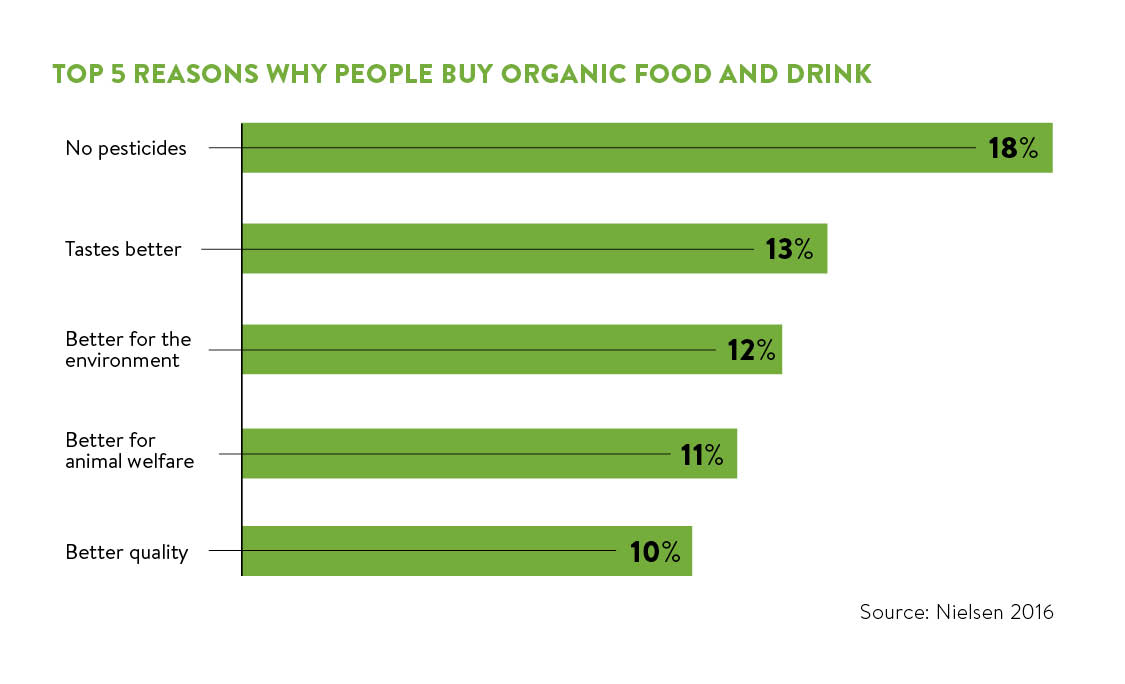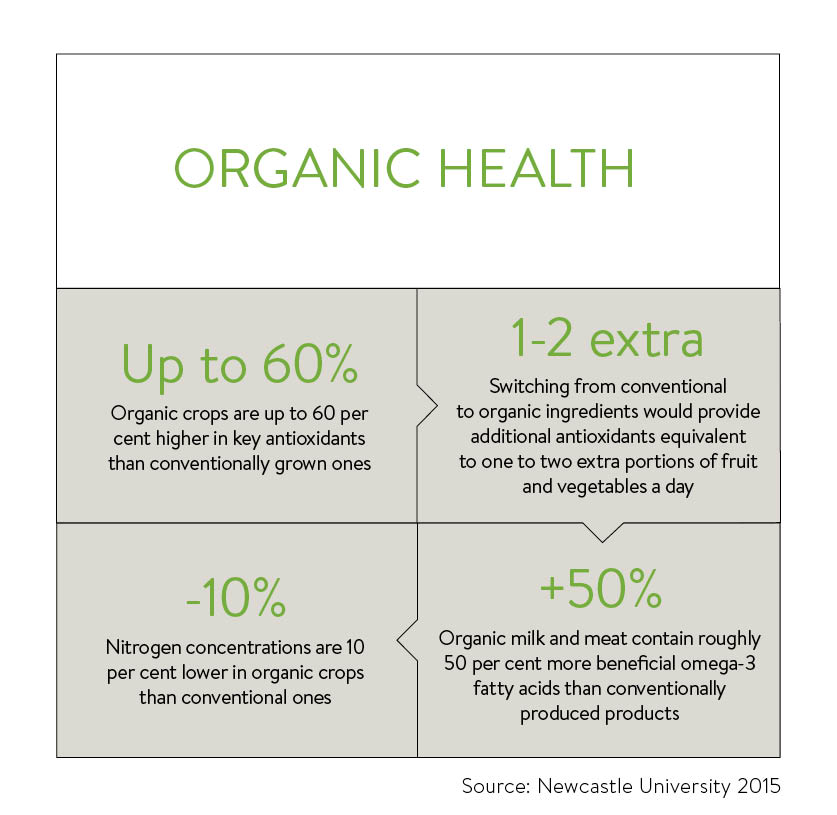Eating organic food and choosing cleaning and beauty products based on how few chemicals they contain may make us feel better, but are they actually healthier?
“Absolutely,” says Catherine Fookes, campaign manager for the Organic Trade Board. “New research released in February 2016 found clear nutritional differences between organic and non-organic milk and meat. Organic meat and dairy produce was found to have a healthier fat profile with about 50 per cent more beneficial omega-3 fatty acids.”
Her confidence is endorsed by Marilyn Glenville, a specialist in women’s health and author of Natural Alternatives to Sugar.
Organic food has more of the antioxidant compounds linked to better health than regular food, and lower levels of toxic metals and pesticides
Dr Glenville says: “It is important for us to eat food in its most natural state as this makes it easier for our bodies to absorb and digest the nutrients contained within those foods.
“People say to me that some research shows that they may not contain more nutrients than non-organic food; other research says they do. But the main reason I choose to buy organic food is that it is not exposed to chemicals in the form of pesticides and herbicides. It is thought that some fruits and vegetables, and especially fragile foods like lettuce and berries, can be sprayed with pesticides up to ten times before they reach the shops.”
Effects on health
Research in 2014, led by Professor Carlo Leifert at Newcastle University, found that organic food has more of the antioxidant compounds linked to better health than regular food, and lower levels of toxic metals and pesticides.
However, the science community is divided on how that translates into improved health.
“Although there are healthy substances in organic foods, it’s difficult to document the health benefits, because people also smoke, drink and take exercise,” says research associate Lizzie Melby Jespersen, from the International Centre for Research in Organic Food Systems at Aarhus University, Denmark, in a January 2016 report. Consumers who stick to organic products are generally healthy individuals, she adds, but it is difficult to assess whether this is entirely down to organic foods.
Certainly there is alarm over how certain chemicals used in non-organic farming affect our bodies. Dr Glenville is concerned by environmental hormone disruptors, endocrine disruptor chemicals (EDCs), xenoestrogens (also known as “foreign” oestrogens) and hormone mimics or blockers. “These chemicals can have effects on every system in our bodies,” she cautions.

“They can affect ovulation and increase our risk of hormonally driven problems, such as polycystic ovary syndrome, fibroids, endometriosis and breast cancer, and they also cause infertility by reducing quality and quantity of sperm in men, push young girls through puberty earlier and create malformations in male babies, such as hypospadias where the opening of the urethra is down the shaft of the penis instead of at the top, and undescended testes.”
These hormonal considerations are also a concern when choosing dairy products, she says. “A cow only produces milk after giving birth,” says Dr Glenville, “so in order to get a constant supply of milk, two months after giving birth, the cow is artificially inseminated again in order to keep the cycle going. So the cow is being milked while it is pregnant. But pregnancy comes with high levels of hormones, especially oestrogen, and these go into the milk supply and other dairy products.”
Last year the International Federation of Gynaecology and Obstetrics issued a warning on the impact of exposure to toxic environmental chemicals to healthy human reproduction. It said: “There are tens of thousands of chemicals in global commerce and even small exposures to toxic chemicals during pregnancy can trigger adverse health consequences. Documented links between prenatal exposure to environmental chemicals and adverse health outcomes span the life course and include impacts on fertility and pregnancy, neurodevelopment and cancer.”
Organic optimism
For Geeta Sidhu-Robb, a mother of three, concerns over severe food allergies, eczema and asthma, when her son Annan was born, drove her to give up her job as a lawyer. She retrained as a food technician, nutritionist and raw-food chef, and nursed him back to health with a dairy and gluten-free diet.
In 2008 she set up Nosh Detox, a home detoxification and weight-loss meal and juice delivery service, taking organic and natural foods to consumers.
Ms Sidhu-Robb is passionate about the value of eating and living well. “When I see people who are not getting the right balance of nutrients from their food, they often say they feel terrible, that they struggle with depression and insomnia. But after four weeks of eating wholesome foods, they are filled with renewed optimism and able to operate at the top of their game,” she says.

It isn’t just food that needs to be healthy. Using chemical-free home and beauty products can play a part. Margo Marrone set up the Organic Pharmacy in 2002 after her training as a pharmacist left her shocked at the questionable ingredients used in cosmetics. She says the market for organic and natural products is at a high. “The global organic personal care market was worth $7.6 billion in 2012, according to Transparency Market Research; by 2018, it is expected to reach $13 billion. It’s growing at a rate of 9.6 per cent a year,” Ms Marrone points out.
Her experience is that natural products offer results. “Over the past 14 years, we have treated hundreds of clients and learnt when they changed their lifestyle, stopped eating processed food, and took natural or organic supplements including antioxidants, they had more energy, slept better and could handle stress,” she says.
“The fact is the more toxins you put inside your body, the more your body has to deal with it. Of course, our bodies are designed to do this, but not to the degree demanded by modern life. Chemicals come at us from every direction, in food, in the atmosphere and absorbed through our skin from cleaning fluids, and our bodies are overwhelmed.”
Ms Marrone has noticed a trend towards wellness. “People are beginning to understand what you do to the inside is as important as what you do on the outside,” she says. “No one asks about the benefits of going organic or choosing natural products any more – they already know.”
Effects on health

Organic optimism

